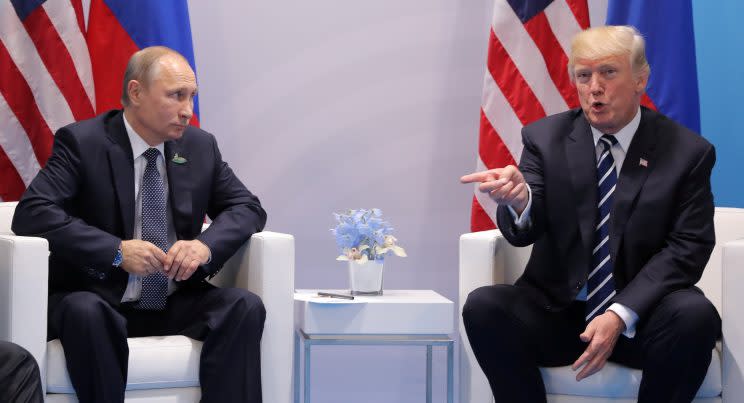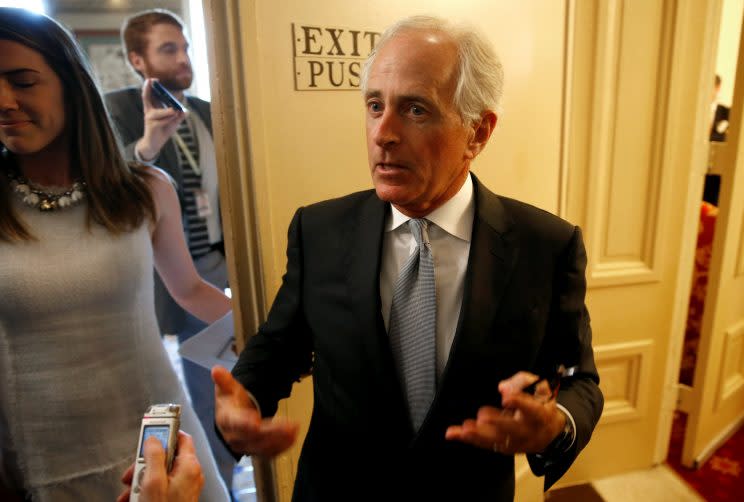With Russia sanctions stalled in the House, White House pushes for weaker provisions

WASHINGTON — Amid a new round of revelations surrounding potential Russian involvement in the 2016 election, a bill ramping up sanctions on the Putin regime is stalled in the House of Representatives.
The bill is intended as a response to Russia’s efforts to influence U.S. elections, as well as its continued provocations in Ukraine. It would increase penalties on Russian firms involved in cyberattacks and require congressional approval for the president to lift the sanctions in the future.
The bill, which passed the Senate almost unanimously, currently sits in the House, and both parties there are accusing each other of holding up its progress. The fight comes amid news that Donald Trump Jr. had been contacted with an offer from Russia of damaging information about Hillary Clinton during the 2016 campaign, according to emails the younger Trump released Tuesday.
Those messages show Trump Jr. agreed to meet with a Russian lawyer supposedly in possession of the damaging material as “part of Russia and its government’s support for Mr. Trump.” They also show that Trump Jr. forwarded the emails to campaign adviser Jared Kushner and then-campaign chief Paul Manafort, with both men attending the meeting.
Sen. Ben Cardin, D-Md., told reporters that the news increased the urgency of passing sanction legislation.
“There’s no question that the United States needs to respond,” Cardin said. “I have contacted House members and urged them to take up and pass this bill quickly.”
The White House has pushed back against the part of the bill requiring it to seek congressional approval to undo the sanctions, with top administration officials arguing that requirement overly constrains its ability to conduct foreign policy.
“Our concern is that the legislation, we believe, sets an unusual precedent of delegating foreign policy to 535 members of Congress by not including certain national security waivers that have always been consistently part of sanctions bills in the past,” Marc Short, the White House’s legislative director, told reporters Monday.
Because of this, the administration has been quietly lobbying Capitol Hill to amend the bill, with Commerce and State Department officials meeting with House staff last week. Other concerns have been raised that the bill would hamper U.S. investment in Russian energy projects, hurting American companies.
In their meeting in Germany Trump and Putin discussed the sanctions imposed by former President Barack Obama in December as a response to the election meddling, White House spokesperson Sarah Huckabee Sanders told reporters Tuesday. That contradicts earlier remarks from the president asserting that the topic was not discussed.

Rep. Adam Schiff, D-Calif., ranking member on the House Intelligence Committee, said Tuesday on MSNBC’s “Morning Joe” he was concerned the administration’s lobbying would affect the bill.
“The question really is not what the members want; the question is what the leadership is willing to allow and how much pressure they’re under,” Schiff said. “Will we get to vote on the bill that came out of the Senate, or will we vote on a watered-down version?”
Division between parties in the House has also slowed down the bill, according to House Speaker Paul Ryan’s office.
Democrats have objected to a change made by the Senate that would allow only the speaker to initiate a review if the president seeks to lift sanctions. Republicans say this is halting the bill’s progress.
“House Republicans are prepared to send the Iran-Russia sanctions bill papers back, which will allow the Senate to automatically resend us a fixed bill,” Ryan spokesperson AshLee Strong said Monday. “But House Democrats are blocking that and demanding their own changes to the bill.”
Rep. Eric Swalwell, D-Calif., told Yahoo News that there was no reason Ryan couldn’t advance the measure.
“Republicans have the majority; if they want to take a vote we can vote on it tonight,” Swalwell said, saying he hoped his colleagues would move to beef up Russia sanctions.
Senators from both parties have called on the House to approve the bill after they approved it with a 98-2 vote last month. Sen. Bob Corker, R-Tenn., chairman of the Senate Foreign Relations Committee, told reporters Monday that Ryan could have a vote if he wanted to.
“There is no issue, except do they want to pass a Russia sanctions bill or not,” he said.
Corker acknowledged that the bill does impose constraints on Trump’s executive powers but that he had not been contacted by the administration in opposition to the bill.
“No one has called me and said, ‘We don’t want this legislation to pass.’ That has never occurred,” Corker said.
—–
Read more from Yahoo News:


